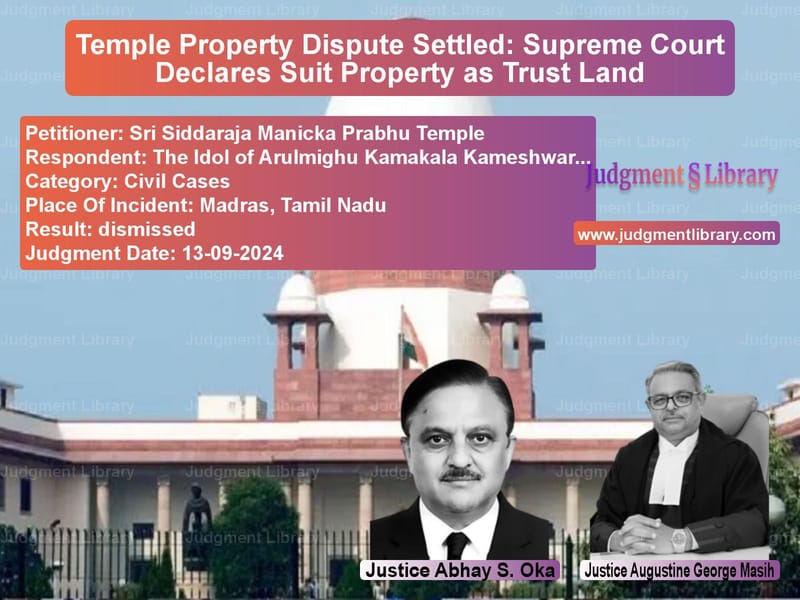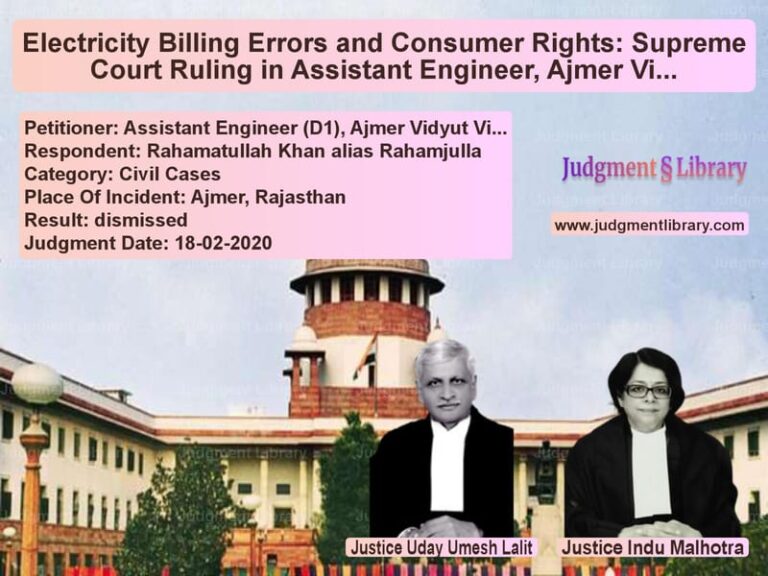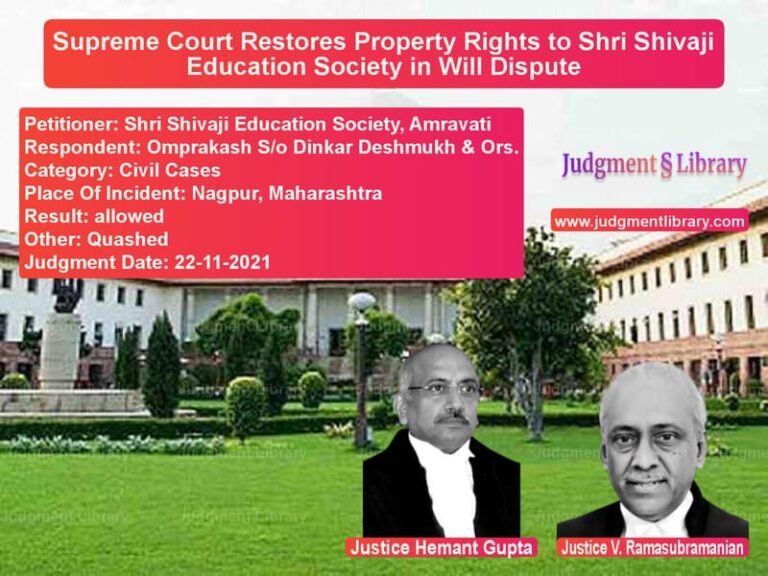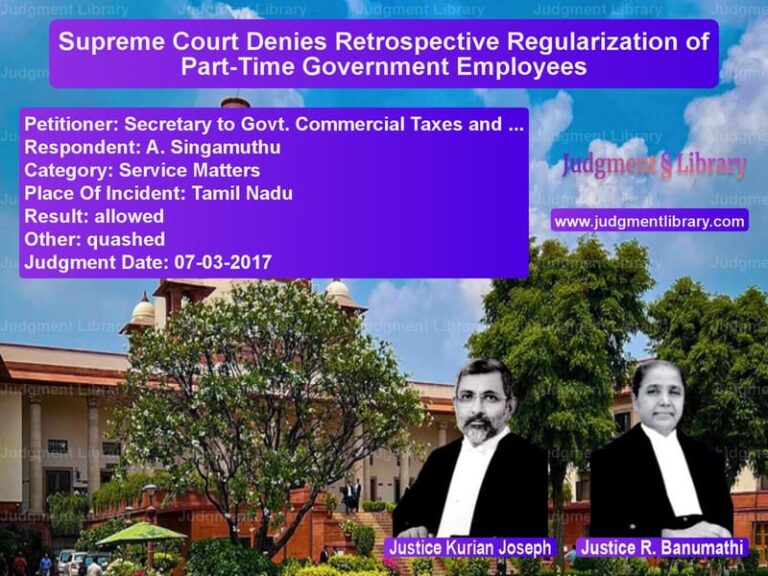Temple Property Dispute Settled: Supreme Court Declares Suit Property as Trust Land
The case of Sri Siddaraja Manicka Prabhu Temple vs. The Idol of Arulmighu Kamakala Kameshwarar Temple revolved around a property dispute between two religious institutions in Tamil Nadu. The Supreme Court upheld the Madras High Court’s decision, ruling that the disputed property was a trust property and could not be claimed by the appellant as a personal asset.
Background of the Case
The case involved the ownership of a property adjacent to the Kamakala Kameshwarar Temple (Respondent-Plaintiff). The property was initially owned by Rai Raja Eswardoss Diawanth Bahadur and was later divided among his son, T. Lakshmidoss, and grandson, T. Venkataprasad. Due to financial difficulties, they were declared insolvent in 1914, and their properties were assigned to an Official Assignee.
In 1915, a Compromise Decree was passed, directing the division of the estate to clear debts. A portion of the property, including the disputed land, was sold to W. Ramakrishna Lala, who created a trust through a Trust Deed dated 12.12.1917. The deed appointed trustees to manage the properties, with revenues designated for temple maintenance.
Legal Disputes and Proceedings
Appellant’s Claim
- The Guru Manicka Prabhu Temple (Appellant-Defendant) claimed absolute ownership over the disputed property.
- It argued that the Compromise Decree (26.11.1929) did not explicitly mention the property as part of the trust.
- The appellant asserted that it had been managing the land independently for decades.
- It challenged the declaration of the Kamakala Kameshwarar Temple as a public temple, claiming the property was private.
Respondent’s Argument
- The respondent contended that the Compromise Decree explicitly categorized the property under trust.
- They pointed out that the appellant was only a trustee and had no ownership rights.
- The land was historically maintained for temple upkeep, reinforcing its trust nature.
- The Respondent-Plaintiff had been managing the suit property as part of the temple since 1946.
Decisions of Lower Courts
The trial court ruled in favor of the Respondent-Plaintiff, holding that the disputed property was part of the trust. The Division Bench of the Madras High Court upheld this decision, ruling that:
- The suit property was clearly mentioned in the trust records.
- The appellant’s prolonged possession did not establish ownership.
- Trust properties cannot be alienated for personal gain.
Supreme Court’s Judgment
1. Interpretation of the Compromise Decree
The Supreme Court examined the provisions of the 1929 decree, concluding:
“The Compromise Decree explicitly states that the property in Schedule ‘A’ remains under trust and must be utilized for the temple’s benefit.”
2. No Absolute Ownership for the Appellant
The Court found that the appellant had failed to prove absolute ownership:
“The head of the Guru Manicka Prabhu Temple could hold the property only as a trustee and not as an absolute owner.”
3. Trust Property Cannot Be Transferred
Rejecting the appellant’s claim, the Court ruled that trust properties cannot be alienated:
“The income derived from the properties was meant solely for temple maintenance and could not be diverted.”
4. Rejection of Res Judicata Argument
The appellant argued that previous rulings on temple status barred the current suit. The Court dismissed this claim:
“The nature of the temple as public or private does not impact the obligations under the Compromise Decree regarding the suit property.”
Final Judgment
The Supreme Court upheld the High Court’s ruling and dismissed the appeal:
“The appeal is devoid of merit and is hereby dismissed.”
Impact of the Judgment
The ruling reinforces key legal principles in property law:
- Trust properties cannot be claimed as personal assets by trustees.
- Legal documents such as compromise decrees are binding in determining property status.
- Possession does not equate to ownership if the property is part of a trust.
This judgment strengthens the protection of religious and charitable properties, ensuring they remain dedicated to their intended purpose.
Petitioner Name: Sri Siddaraja Manicka Prabhu Temple.Respondent Name: The Idol of Arulmighu Kamakala Kameshwarar Temple.Judgment By: Justice Abhay S. Oka, Justice Augustine George Masih.Place Of Incident: Madras, Tamil Nadu.Judgment Date: 13-09-2024.
Don’t miss out on the full details! Download the complete judgment in PDF format below and gain valuable insights instantly!
Download Judgment: sri-siddaraja-manick-vs-the-idol-of-arulmigh-supreme-court-of-india-judgment-dated-13-09-2024.pdf
Directly Download Judgment: Directly download this Judgment
See all petitions in Property Disputes
See all petitions in Succession and Wills
See all petitions in Judgment by Abhay S. Oka
See all petitions in Judgment by Augustine George Masih
See all petitions in dismissed
See all petitions in supreme court of India judgments September 2024
See all petitions in 2024 judgments
See all posts in Civil Cases Category
See all allowed petitions in Civil Cases Category
See all Dismissed petitions in Civil Cases Category
See all partially allowed petitions in Civil Cases Category







